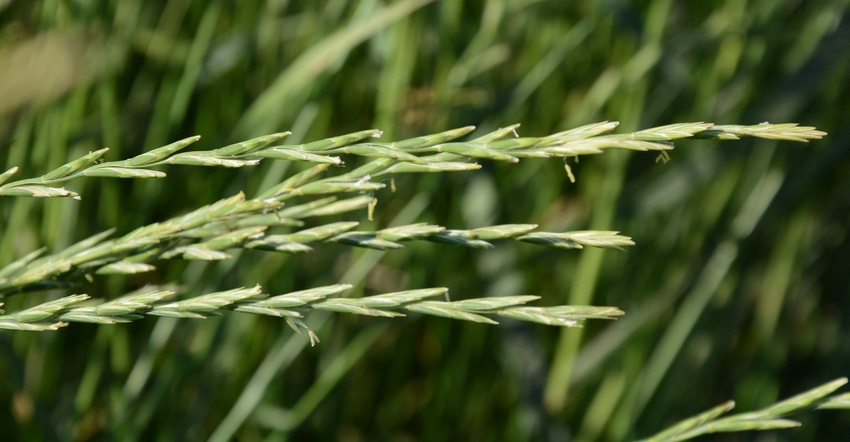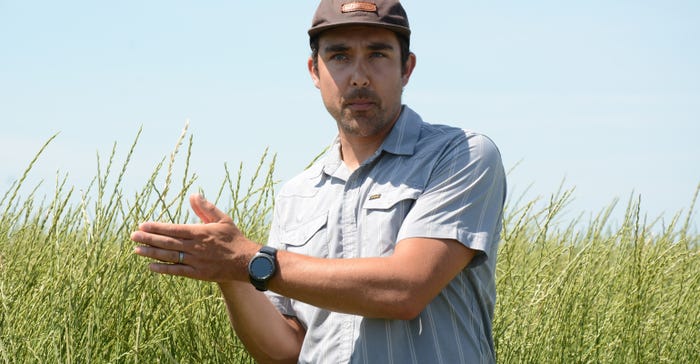September 21, 2020

A multiple-state coalition of researchers, farmers, educators, industry leaders, policy experts and climate scientists recently received a competitive, five-year, $10 million grant to scale the research, production, awareness and commercialization of Kernza, the first commercial perennial grain in the U.S. The grant was awarded through the USDA National Institute of Food and Agriculture’s Agriculture and Food Research Initiative’s Sustainable Agricultural Systems program.
Kernza is the trademark name for the perennial grain harvested from new varieties of intermediate wheatgrass, a forage grass that has been used by farmers across the U.S. for decades. As a perennial, Kernza is planted once and provides several years of harvestable grain. Kernza has a deep root system that provides multiple environmental benefits, including improving water and soil quality and reducing soil erosion. Additionally, research has shown that this new perennial grain can increase farm income due to decreased inputs and costs from reduced tilling, pesticide requirements and nutrient runoff.
The project, formally titled Developing and Deploying a Perennial Grain Crop Enterprise to Improve Environmental Quality and Rural Prosperity, seeks to advance agriculture production by developing the blueprint for U.S. agricultural systems to shift from annual row crop production that requires tilling and planting every year to perennial production. By building the support system necessary to successfully increase Kernza acres, the project aims to improve the environmental sustainability of food production and demonstrate the viability of new perennial crops as real economic opportunities for farmers and rural communities.
“The Land Institute [based in Kansas] launched the research and development of Kernza nearly two decades ago with the vision of transforming agriculture to a just, diverse and perennial system,” says Rachel Stroer, acting president of The Land Institute, a partner in the project. “This grant is built on years of active collaboration among the stakeholders and is an exciting step toward our vision for Kernza and other future perennial grains being developed at The Land Institute and partner institutions globally.”
The project, informally called the Kernza Cap project, brings together partners from multiple states to form teams that will lead research and activities focused on breeding, agronomics, environmental quality, supply chains and education. Each team is composed of academic and nonacademic experts, including researchers, industry leaders, farmers, educators and policymakers representing 10 universities and 24 nonprofit and farm and food organizations. A sixth team focused on integration will be charged with ensuring that the project’s many partners are communicating and cross-collaborating effectively and efficiently.
Jacob Jungers, University of Minnesota assistant professor in the Department of Agronomy and Plant Genetics at the College of Food, Agricultural and Natural Resource Sciences, and leading coordinator of the project, says a critical part of the Kernza Cap project is integration.
“The project will align research, education, commercialization and implementation efforts to operate in concert on a local to national scale,” Jungers says. “It will simultaneously advance the genetics of Kernza, guide farmers on how to grow it, and partner with companies on how to use and market it.”
He adds that the collaboration will help ensure that Kernza is agronomically sound, economically viable and environmentally sustainable.

COORDINATING THE EFFORT: University of Minnesota assistant professor and agronomist Jacob Jungers is leading coordinator of the Kernza Cap, a multistate project that will align Kernza research, education, commercialization and implementation efforts from a local to national scale.

Results from the Kernza Cap project will include new cultivars that yield more grain and enhance critical ecosystem services, a better understanding of those ecosystem services, as well as multiple operating regional supply chains and increased national market demand for Kernza.
Additional goals of the project include developing a wide range of educational materials for teaching perennial agriculture concepts in K-12, higher education and adult learning contexts; documenting best management practices for Kernza production; and piloting opportunities and approaches for state and federal policies that support increased Kernza production.
The Kernza Cap project officially launched Sept. 1. For more information on Kernza, research and field day demonstration information, visit kernza.org/kernzacap.
Source: The University of Minnesota, which is solely responsible for the information provided and is wholly owned by the source. Informa Business Media and all of its subsidiaries are not responsible for any of the content contained in this information asset.
You May Also Like




